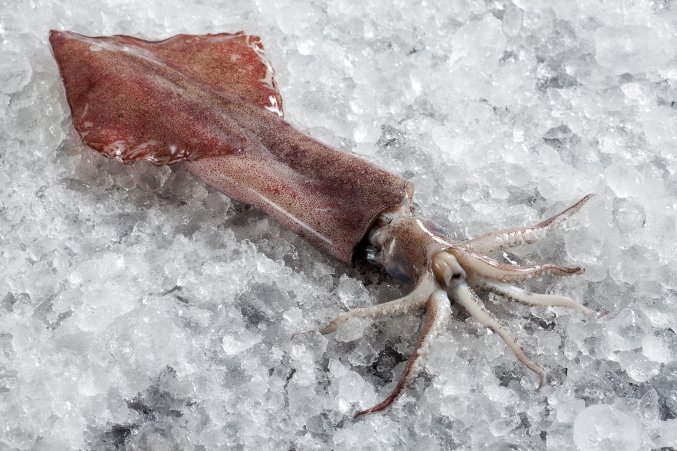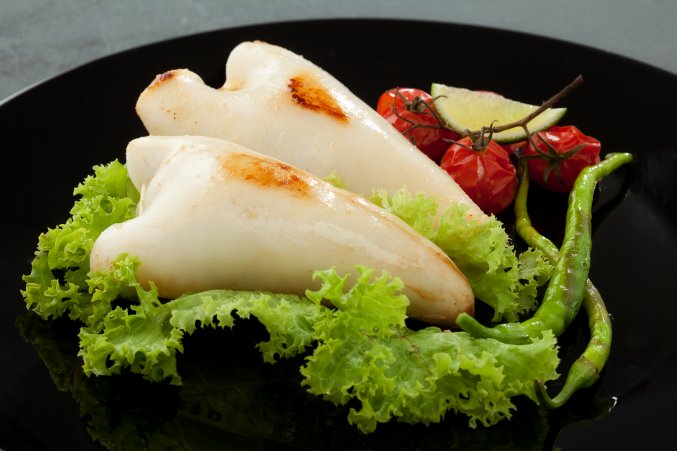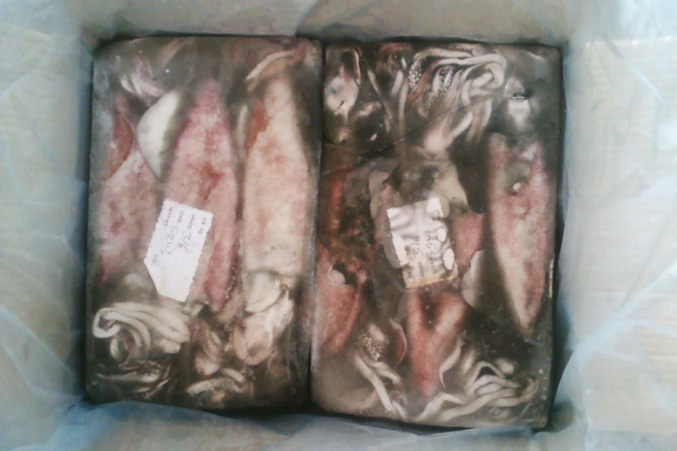WR Indian Squid
Indian Squid is a Cephalopod species with 2 fins, 6 arms and 2 tentacles. It is rich in terms of species varieties. If they are catched carefully, their shelf life becomes longer. If it is thawed a couple of times when it is frozen, it is affected a little and elasticity is not changed. It is catched by hook, purse seine and trawl.
Fresh squid has whiffet and thin skin. It can be found in the market as whole fresh, whole frozen, tube, ring, tentacles, beefs, ink, value added and stuffed. Especially Loligo species is often consumed in America.
Product Description
|
Product name |
Denizer Deep Frozen WR Indian Squid 12 kg |
|
Latin name |
Loligo duvauceli |
|
External barcode |
U3: 8680539203022
3-6: 8680539203008
6-10: 8680539203046 |
|
Internal barcode |
- |
|
Size |
U3 , 3-6, 6-10 / Size before glazing √ / Size after glazing |
Product description
|
After catching, squid is graded as whole, placed to plates with water and freezed immediately. After freezing, the product is packed in 2 kg individual pack. |
|
Freezing type |
BQF (Block Quick Freezer) |
|
Packing type |
6x2 kg / 3x4 kg individual pack |
|
Ingredients |
WR squid (80%), water (20%) |
|
Production type |
Farmed / Catch √ (FAO : 51 ) / Value added |
|
Origin |
India |
Units per package
|
U3: 36 pcs/12 kg
3-6: 60 pcs/12 kg
6-10: 110 PCS/12 kg |
|
Glazing rate |
20% |
|
Product type |
WR squid |
|
Broken pieces |
Max 2-3 pcs / 12 kg |
|
Appearence |
Red skin, specific appearence |
|
Smell |
Specific smell |
|
Taste |
Specific, not bitter or sour, natural taste |
|
Texture |
Strict, not dry |
|
Average weight |
U3: 330 g / 3-6: 180 g / 6-10: 100 g |
|
Shelf life |
After production date, first 24 months |
|
Additives |
No chemical |
|
Outer package |
Original printing microwave corrugated cardboard box (PAP)(28x39x18 cm) |
|
Inner package |
PE individual bag |
Packing criteria
|
The total migration value of components of plastic substances and materials to foodstuff, per square decimeter surface area of substance or material can not be more than 10 mgs. This value is defined as the limit of total migration of plastic substance and materials (mg/dm2). |
Storage conditions
|
Should transport and storage at min -18°C. Transportation should be without contamination and complete with no break of cold chain. |
Nutrition facts
|
Energy (kcal/100 g) |
92 |
|
Fat (g/100 g) |
1,38 |
|
Protein (g/100 g) |
15,58 |
|
Cholesterol (mg/100g) |
233 |
|
Na (mg/100g) |
44 |
|
Carbonhydrate (mg/100g) |
3,08 |
|
Vit A (%/100 g) |
1 |
|
Vit C (%/100 g) |
8 |
|
Ca (%/100 g) |
3 |
|
Fe (%/100 g) |
4 |
|
Omega 3 (g/100 g) |
0,642 |
Chemical Parameters
|
Hg (mg/kg) |
0,5 |
|
Cd (mg/kg) |
1 |
|
Pb (mg/kg wet weight) |
1 |
|
Total max dioxins (pg/g wet weight) |
3,5
|
|
Total max dioxins and dioxin like PCBs (pg/g wet weight) |
6,5
|
|
Total PCB28, PCB52, PCB101, PCB138, PCB153 and PCB180 (ng/g wet weight) |
75
|
Microbiological Parameters
|
Histamin (mg/kg) |
100-200 |
|
Salmonella spp(g-ml) |
- |
|
Listeria monocytogenes (g-ml) |
- |
Legal Criteria
|
GKGM Regulation on water intended for human consumption |
|
GKGM Regulation on microbiological criteria |
|
GKGM Regulation on contaminants |
|
GKGM Regulation on labelling |
|
GKGM Regulation on packaging waste control |
|
GKGM Statement of plastic materials in contact with foodstuffs |
|
Turkish Food Codex Regulation |
Determination of Net Weight
|
Apparatus |
|
For packages up to 5 pounds (2.27 kg), use scale of adequate capacity with sensitivity of 0.01 oz. (0.28 g). |
|
For packages over 5 pounds (2.27 kg), use scale of adequate capacity with sensitivity of 0.025 oz. (0-71 g). |
|
Procedure |
|
Set scale on firm support and level. Adjust 0 load indicator or rest point and check sensitivity. Remove package from low temperature storage, remove frost and ice from outside of package, and weigh immediately (W). Open package; remove contents, including any product particles and frost crystals. Air-dry empty package at room temperature and weigh (E). Weight of contents=W-E. |
|
*Acc to AOAC offical method 963.26 net contents of frozen food containers-unglazed foods |
Spawning
|
Jan |
Feb |
Mar |
Apr |
May |
Jun |
Jul |
Aug |
Sep |
Oct |
Nov |
Dec |
|
|
|
|
|
|
X |
X |
|
|
|
|
|






